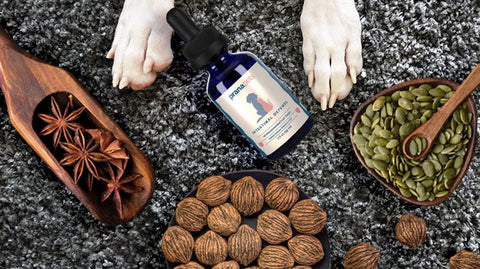

Key Highlights
- Understanding intestinal parasites in pets and the types of worms they can have
- How pets contract intestinal parasites and the importance of prevention
- The benefits of choosing natural dewormers over chemical dewormers
- Key ingredients in natural dewormers like pumpkin seed, wormwood herb, anise seed, and cloves
- The role of other essential ingredients like black walnut hull, herb of grace, neem bark, and buckthorn bark
- Tips for implementing natural dewormers in your pet's routine and preventing future infestations
Introduction
As pet owners, it is our responsibility to ensure the health and well-being of our furry friends. One common health issue that can affect both cats and dogs is Intestinal parasites. These parasites, also known as worms, can cause a range of health problems and discomfort for our pets. Fortunately, there are effective natural dewormers available that can help eliminate these parasites and keep our pets healthy. In this blog, we will explore the key highlights of natural dewormers for cats and dogs, including the types of worms, how pets contract intestinal parasites, the benefits of choosing natural dewormers over chemical alternatives, and the key ingredients found in natural dewormers. We will also discuss how to implement natural dewormers in your pet's routine and prevent future infestations. By understanding these important aspects, you can make informed decisions about the health and well-being of your beloved pets.
Understanding Intestinal Parasites in Pets
Intestinal parasites, also known as worms, are a common problem in cats and dogs. These parasites can live in the digestive system and cause a range of health issues. The most common types of worms that affect pets include tapeworm segments, roundworms, hookworms, and whipworms.
Tapeworm segments are flat, segmented worms that can be seen in the feces of infected pets. Roundworms are long, spaghetti-like worms that live in the small intestine. Hookworms are small worms that attach themselves to the intestinal wall and feed on blood. Whipworms are thin, whip-like worms that live in the large intestine.
To diagnose the presence of worms in your pet, a fecal test is typically performed. This involves analyzing a stool sample to check for the presence of worm eggs or segments. It is important to note that not all worms lay eggs consistently, so multiple fecal tests may be necessary to confirm an infestation. Regular fecal testing is recommended to detect and treat worm infestations early.
The Common Types of Worms in Cats and Dogs
- Tapeworm segments: These flat, segmented worms can be seen in the feces or around the anus of infected pets. They are usually transmitted by fleas or by ingesting infected prey.
- Roundworm: These long, spaghetti-like worms live in the small intestine of infected pets. They can be transmitted through the ingestion of contaminated soil, feces, or through the mother's milk in puppies and kittens.
- Hookworms: These small worms attach themselves to the intestinal wall and feed on blood. They can be contracted by ingesting contaminated soil or through the skin, such as when walking barefoot.
- Whipworms: These thin, whip-like worms live in the large intestine and can cause diarrhea, weight loss, and anemia. They are usually contracted by ingesting contaminated soil or feces.
These types of worms can cause a range of symptoms in pets, including diarrhea, vomiting, weight loss, and a dull coat. In severe cases, worms can lead to anemia, weakness, and even death. Regular deworming is essential to keep your pets healthy and prevent the spread of worms to other animals.
How Pets Contract Intestinal Parasites
Pets can contract intestinal parasites through various means. Outdoor cats have a higher risk of getting infected with worms as they have more exposure to contaminated soil, feces, and other animals. Fleas can also transmit internal parasites, such as tapeworms, when pets ingest them while grooming themselves.
In some cases, pets can be born with intestinal parasites if their mother is infected. For example, roundworms can be transmitted from the mother to the offspring through the placenta or in the milk. This is why it is important to deworm puppies and kittens at an early age.
Weight loss is a common symptom of intestinal parasites in pets. The worms compete with the pet for nutrients, leading to a poor absorption of nutrients from the food they eat. This can result in weight loss and a dull coat. Therefore, it is crucial to take preventive measures and regularly deworm your pets to ensure their overall health and well-being.
articleproducts1
The Role of Natural Dewormers
Natural dewormers play a vital role in keeping our pets healthy and free from intestinal parasites. Unlike chemical dewormers, natural dewormers are made from plant-based ingredients and are free from harmful chemicals. They work by targeting and eliminating the worms in a gentle and safe manner. Natural dewormers not only help eliminate the parasites but also support the overall health and well-being of our pets.
Benefits of Choosing Natural Over Chemical Dewormers
Choosing natural dewormers over chemical alternatives has several benefits. One of the main advantages is the lack of side effects. Chemical dewormers can sometimes cause adverse reactions in pets, such as nausea, vomiting, and diarrhea. Natural dewormers, on the other hand, are generally well-tolerated and do not have these side effects.
Another benefit of natural dewormers is that they support the immune system. Natural ingredients used in these dewormers, such as herbs and essential oils, can help boost the immune system and improve overall health. By strengthening the immune system, pets are better equipped to fight off infections and prevent future infestations.
Using natural dewormers also aligns with the trend of using natural remedies for pet health. Many pet owners prefer to avoid chemical-based products and opt for more natural alternatives. Natural dewormers provide a safe and effective option for keeping pets free from intestinal parasites.
How Natural Ingredients Work to Eliminate Worms
Natural dewormers often contain ingredients that have specific properties to eliminate worms. For example, diatomaceous earth is a fine powder made from the fossilized remains of tiny aquatic organisms. When ingested, it acts as a mechanical agent, dehydrating and killing the worms. It is important to use food-grade diatomaceous earth specifically formulated for pets.
Other natural ingredients, such as herbs and essential oils, can have antiparasitic, anti-inflammatory, and immune-boosting properties. These ingredients work together to target and eliminate the worms from the digestive tract. By using natural dewormers, you can effectively eliminate the parasites without exposing your pet to harmful chemicals.
Natural dewormers also support the overall health of your pet. They help maintain a healthy digestive tract and support a strong immune system, making your pet less susceptible to future infestations. Choosing natural ingredients is a safe and effective way to keep your pet free from worms.
Key Ingredients of Prana Pets Intestinal Defense
Prana Pets Intestinal Defense is a natural deworming product that contains key ingredients known for their antiparasitic properties. These ingredients include pumpkin seed, wormwood herb, anise seed, and cloves. Together, these ingredients work synergistically to eliminate worms and support the overall health of your pet.
Pumpkin Seed: Nature’s Defense Against Parasites
Pumpkin seeds are a powerful natural deworming ingredient that can help eliminate parasites from the digestive tract. They contain cucurbitacin, a compound that has been shown to have antiparasitic properties. Cucurbitacin paralyzes the worms, making it easier for them to be eliminated from the body.
In addition to their antiparasitic properties, pumpkin seeds are also rich in essential nutrients, such as amino acids, vitamins, and minerals. These nutrients support the overall health of your pet and contribute to a strong immune system.
To use pumpkin seeds as a natural dewormer, simply grind raw pumpkin seeds and mix them into your pet's food. The recommended dosage is 1 teaspoon of ground pumpkin seeds per 10 pounds of body weight per day. By incorporating pumpkin seeds into your pet's routine, you can help protect them against parasites and support their overall health.
Wormwood Herb: The Ancient Vermifuge
Wormwood herb has a long history of use as a natural vermifuge, meaning it has the ability to eliminate worms from the body. It has been used for centuries to treat various parasitic infections and has shown effectiveness against a wide range of parasites.
Wormwood contains compounds such as thujone and santonin, which have antiparasitic properties. These compounds work by disrupting the nervous system of the parasites, leading to their elimination from the body.
To use wormwood as a natural dewormer, it is important to follow the recommended dosage for your pet's weight. Wormwood can be toxic if used in excessive amounts, so it is crucial to consult with your veterinarian before using it as a deworming treatment. When used correctly, wormwood herb can be a safe and effective natural remedy for eliminating parasites from your pet's digestive tract.
Anise Seed: More Than Just a Flavor Enhancer
Anise seed is not only known for its distinct flavor but also for its ability to support digestive health. It has been used for centuries to aid digestion and alleviate symptoms such as bloating and flatulence.
In addition to its digestive benefits, anise seed also has antiparasitic properties. It can help eliminate worms from the digestive system and support the overall health of your pet.
Anise seed can be used as a natural dewormer by incorporating it into your pet's diet. You can sprinkle ground anise seed over their food or brew it into a tea and add it to their water. The recommended dosage is 1/4 teaspoon of ground anise seed per 10 pounds of body weight per day. By including anise seed in your pet's routine, you can promote healthy digestion and help eliminate parasites.
Cloves: A Spicy Solution for Worms
Cloves are not just a popular spice; they also have antiparasitic properties that can help eliminate worms from the digestive tract. Cloves contain compounds such as eugenol, which have been shown to have antiparasitic and anti-inflammatory effects.
In addition to their antiparasitic properties, cloves also have antioxidant and immune-boosting benefits. They can help reduce inflammation in the digestive system and support overall health.
To use cloves as a natural dewormer, you can grind them into a powder and mix them into your pet's food. The recommended dosage is 1/4 teaspoon of ground cloves per 10 pounds of body weight per day. By incorporating cloves into your pet's routine, you can help eliminate parasites and promote a healthy digestive system.
articleproducts2
More Essential Ingredients for Parasite Defense
In addition to the key ingredients mentioned above, there are other essential ingredients that can contribute to parasite defense. These include black walnut hull, herb of grace, neem bark, and buckthorn bark. These ingredients have antiparasitic properties and can help eliminate worms from the digestive tract. They also support overall health and promote a healthy digestive system.
Black Walnut Hull: Nature’s Intestinal Cleanser
Black walnut hull is a powerful natural ingredient that acts as an intestinal cleanser. It has been used for centuries to eliminate intestinal parasites and promote detoxification.
Black walnut hull contains compounds such as juglone, which have antiparasitic properties. These compounds can help eliminate intestinal parasites and cleanse the digestive system.
In addition to its antiparasitic benefits, black walnut hull also helps remove toxins from the body and supports overall health. It is rich in antioxidants, vitamins, and minerals that contribute to a healthy immune system.
To use black walnut hull as a natural dewormer, it is important to follow the recommended dosage for your pet's weight. The recommended dosage is 1/4 teaspoon of black walnut hull powder per 10 pounds of body weight per day. By incorporating black walnut hull into your pet's routine, you can help eliminate parasites and promote a healthy digestive system.
Herb of Grace: Revitalizing Pet Health
The herb of grace, also known as rue, has long been used for its medicinal properties. It has antiparasitic, anti-inflammatory, and immune-boosting benefits that can support overall pet health.
The herb of grace has been shown to have antiparasitic properties that can help eliminate worms from the digestive system. It also supports healthy digestion and promotes vitality in pets.
In addition to its antiparasitic benefits, the herb of grace can help reduce inflammation in the digestive system and support the immune system. By incorporating the herb of grace into your pet's routine, you can help eliminate parasites and promote overall health and vitality.
Neem Bark: A Potent Anti-Parasitic Agent
Neem bark is a potent natural ingredient with antiparasitic properties. It has been used for centuries in traditional medicine to eliminate parasites and support overall health.
Neem bark contains compounds such as azadirachtin, which have been shown to have strong antiparasitic effects. These compounds can help eliminate parasites from the digestive system and promote detoxification.
In addition to its antiparasitic benefits, neem bark also has antioxidant and anti-inflammatory properties that support overall health. It can help reduce inflammation in the digestive system and promote a healthy immune system.
To use neem bark as a natural dewormer, it is important to follow the recommended dosage for your pet's weight. The recommended dosage is 1/4 teaspoon of neem bark powder per 10 pounds of body weight per day. By incorporating neem bark into your pet's routine, you can help eliminate parasites and promote overall health.
Buckthorn Bark: Supporting Digestive Health
Buckthorn bark is a natural ingredient that supports digestive health and can help eliminate worms from the digestive system. It has been used for centuries to treat constipation and promote healthy digestion.
Buckthorn bark contains compounds such as anthraquinones, which have laxative properties. These compounds can help relieve constipation and promote regular bowel movements, which is important for eliminating worms from the body.
In addition to its digestive benefits, buckthorn bark also has antiparasitic properties that can help eliminate worms from the digestive system. It supports overall digestive health and can contribute to a healthy immune system.
To use buckthorn bark as a natural dewormer, it is important to follow the recommended dosage for your pet's weight. The recommended dosage is 1/4 teaspoon of buckthorn bark powder per 10 pounds of body weight per day. By incorporating buckthorn bark into your pet's routine, you can help support digestive health and eliminate parasites.
Implementing Natural Dewormers in Your Pet’s Routine
Implementing natural dewormers in your pet's routine is relatively easy and can help keep them healthy and free from parasites. By following a few simple tips, you can ensure that your pet receives the proper dosage and support for their overall health.
Dosage and Administration Tips
When using natural dewormers, it is important to follow the recommended dosage for your pet's body weight. Each natural dewormer will have specific instructions on the packaging, which should be carefully followed.
Moderation is key when administering natural dewormers to your pet. It is important not to exceed the recommended dosage, as this can be harmful. If you are unsure about the appropriate dosage for your pet, consult with your veterinarian for guidance.
Natural dewormers can be administered in various forms, including powders, capsules, or liquids. Follow the instructions provided by the manufacturer for the proper administration method.
It is also important to note that natural dewormers may take some time to be effective. It is recommended to continue the treatment for the recommended duration to ensure that all parasites are eliminated.
Observing Your Pet’s Response to Treatment
When using natural dewormers, it is important to observe your pet's response to the treatment. Keep an eye on their stool and look for any signs of worms or worm segments. If you notice any worms or segments in their stool, it is a sign that the dewormer is working.
It is also important to monitor your pet for any signs of adverse reactions to the treatment. These can include vomiting, diarrhea, or any other changes in behavior or appearance. If you notice any unusual symptoms, contact your veterinarian for further guidance.
In some cases, your veterinarian may recommend collecting a stool sample after the treatment to confirm that all parasites have been eliminated. This can be done by using a clean container to collect a fresh sample and bringing it to your veterinarian for analysis.
By observing your pet's response to treatment and seeking veterinary guidance when needed, you can ensure that the natural dewormer is effective and safe for your pet.
articleproducts3
Preventing Future Infestations
Preventing future infestations is crucial to keeping your pets healthy and free from parasites. By following a few simple tips, you can reduce the risk of your pet getting re-infected.
Diet and Nutrition: Building a Hostile Environment for Parasites
A healthy diet and proper nutrition play a vital role in preventing future infestations. Feeding your pet a balanced and nutritious diet can boost their immune system and create a hostile environment for parasites.
Include high-quality protein sources, fruits, and vegetables in your pet's diet. These provide essential nutrients and antioxidants that support overall health and help maintain a healthy digestive system.
It is also important to avoid feeding your pet raw or undercooked meat, as it can be a source of parasites. Ensure that any meat or fish in your pet's diet is properly cooked or prepared to eliminate the risk of parasites.
By providing your pet with a nutritious diet, you can strengthen their immune system and reduce the risk of future infestations.
Regular Check-ups and Maintaining a Clean Environment
Regular check-ups with your veterinarian are essential for preventing future infestations. Your veterinarian can perform routine fecal tests and recommend appropriate deworming treatments based on your pet's specific needs.
Maintaining a clean environment is also crucial in preventing parasite infestations. Regularly clean your pet's living area, including their bedding and litter box, to remove any potential sources of parasites. This includes removing feces promptly and regularly disinfecting their living space.
Additionally, protect your pet from fleas and ticks by using appropriate preventatives. Fleas and ticks can carry and transmit intestinal parasites, so it is important to keep your pet protected from these external parasites.
By scheduling regular check-ups and maintaining a clean environment, you can help prevent future infestations and keep your pets healthy.
Conclusion
In conclusion, natural dewormers offer a safe and effective alternative for maintaining your pets' health. By choosing natural over chemical dewormers, you prioritize their well-being. The powerful ingredients like pumpkin seed, wormwood herb, anise seed, cloves, black walnut hull, herb of grace, neem bark, and buckthorn bark work synergistically to eliminate parasites and support digestive health. It's crucial to observe your pet's response and implement preventive measures like a balanced diet and regular check-ups. With natural dewormers, you can ensure your furry companions stay happy and healthy for years to come.
Frequently Asked Questions
Can natural dewormers completely replace traditional ones?
Natural dewormers can be effective in eliminating parasites from your pet's digestive system. However, it is important to consult with your veterinarian to determine the most appropriate deworming treatment for your pet's specific needs.
How long does it take to see results with natural dewormers?
The time frame for seeing results with natural dewormers can vary depending on the severity of the infestation. It may take several weeks to completely eliminate the parasites. Observation of your pet's stool and behavior can help determine the effectiveness of the treatment.




